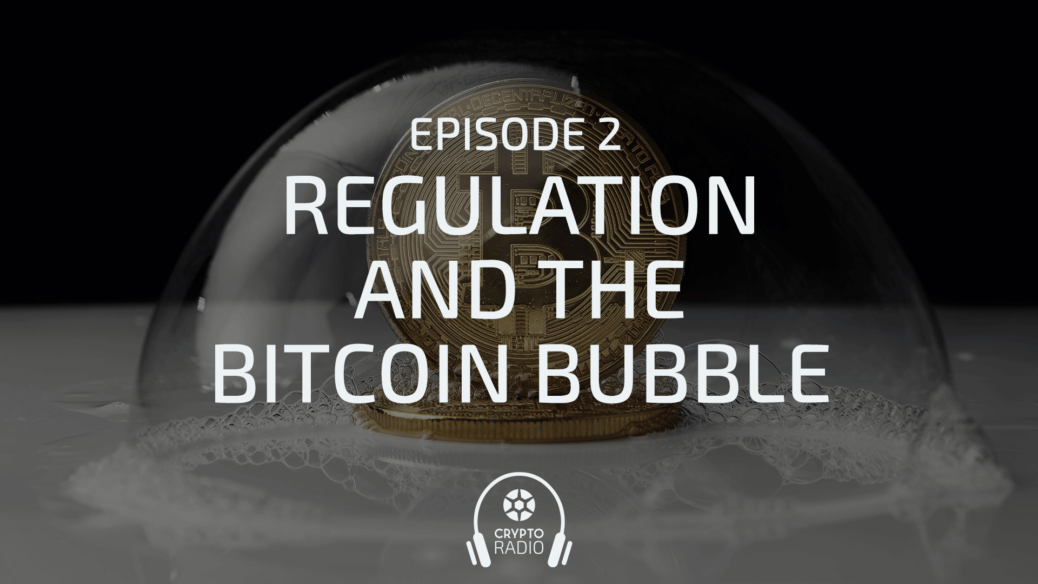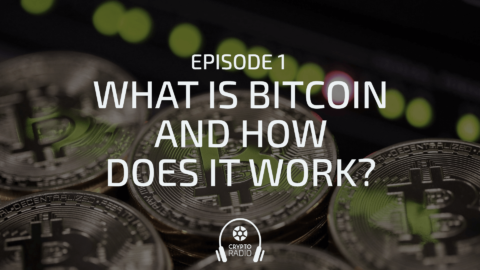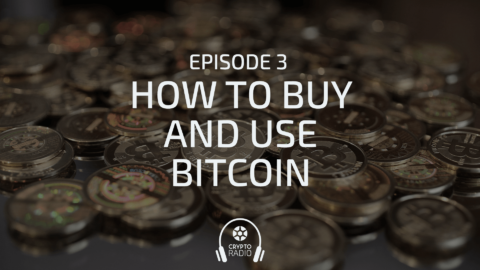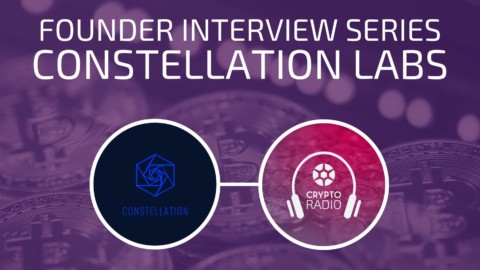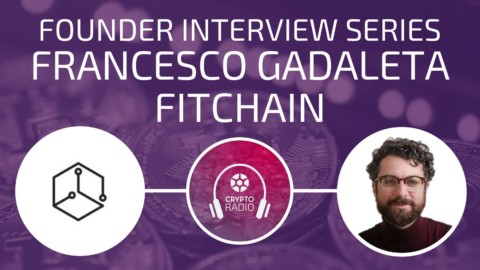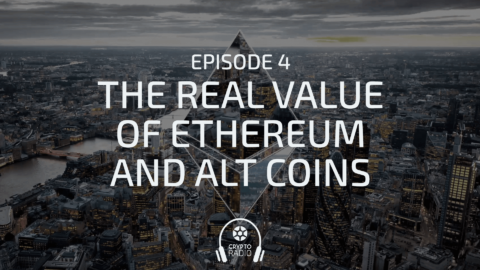Podcast: Play in new window | Download
[00:00:00] Mike Gilliland: Welcome to Crypto Radio. We interview top thinkers and entrepreneurs in the cryptocurrency and blockchain industry. We also cover topics like investing, trading and ICOs. We’re your hosts , Mike Gilliland, Michael Pole, Chris Sparks, and Euvie Ivanova. We’re entrepreneurs, crypto investors, and co-founders of a new Blockchain Investment Platform called CoSyndicate.io. We created CoSyndicate and Crypto Radio to make crypto investing a better experience for you. In the first few episodes of this podcast. we’re going to cover the basics [00:00:30] of Bitcoin, blockchains and crypto investing. If you’re new to the space, these episodes are for you. If not, skip ahead to the episodes where we start to interview founders of blockchain projects, and update you on all the news and important events in the crypto world. Over the next few episodes, we’re going to be running a contest to give you a chance to win over $3,000 worth of prizes, including CoSyndicate tokens, and a free membership to our private investment mastermind group., To learn how to participate, go to cryptoradio.io.
Chris Sparks: People should really sort of understand [00:01:00] I think that the current form of Bitcoin that we have as far as people see it as something that’s worth $17,000, this is a very new thing for Bitcoin in a long-term context. Bitcoin has become something that holds value very well, and people all agree that it’s a store of value now, but the regulation question keeps on coming up I think in everyone’s mind. Is it going to be regulated? Has it been regulated? And maybe you guys can sort of illuminate at that for the audience a little bit.
Michael Pole: Yeah, I think it comes back to the question of legality, and what governments can actually do to regulate it. [00:01:30] So, they can kind of regulate the players in a way. Like they could, you know, try and take out the miners who are, you know, providing value to the network .They could try and control the exchanges and those people they can identify, but in terms of regulating the use of it, it’s almost impossible because it’s all happening all the time. They don’t have the manpower , the resources to even stop people. So, typically, when they try and regulate something, as they’ll create a reason why they need to regulate it, like you’re saying it’s used for criminals, or it’s dangerous, or you know, it’s a bubble. We need to protect people. So, there’s always some pretext for coming in and regulating something. [00:02:00] But, typically, all it is about is about controlling it for the purposes of, you know, taxing it or forcing people to use it in a certain way, or creating your own version of something and saying this is the safe one, we need to regulate and use the safe version, you know. Everyone else can use a dangerous version, that’s going to be unsafe, so I think people have to use their own minds to decide what is in the best interests for you may not be in the best interest for the government, and you have to, you know, it’s country by country in terms of, you know, what the regulations are going to be I think. The more progressive countries like South Korea are actually really embracing, you know, cryptocurrencies in general. So, they’re starting to see they will have an edge [00:02:30] if they embrace this first because it’s just a more efficient transfer of value, and those are the kind of countries and jurisdictions you might want to do your business, or, you know, look to see who’s copying those examples and actually embracing stuff because there’s always resistance to change, and that’s really what regulation comes down to in this context. It’s like how much can they resist the change and how effective is that going to be against the tidal wave of demand that’s just coming, and it’s global, right? So, they can’t stop it. So, regulation is largely ineffective, but it is short-term painful for some people if, you know, their Bitcoins are confiscated or their bank accounts are shut down. There’s certain risks, yeah, you have to [00:03:00] be aware of in that, in that scenario, but there are governments that are very much more progressive.
Mike Gilliland: On some level, it could create a situation where governments are now competing to be the place that attracts innovation entrepreneurship. Especially as countries like the United States start cracking down on this, innovation entrepreneurship is going to move. So, as long as there is a country, minimum one, in the world that supports blockchains and ICOs and cryptocurrencies, then that’s where the Innovation will take place.
Euvie Ivanova: And those countries will thrive because there’s now, [00:03:30] as of yesterday, the whole market cap of all the cryptocurrencies is, what was it? Half a trillion? Yeah, there’s a lot of money in the space, so the government’s that embrace it will thrive. That country will thrive, you know. The businesses and the lawyers and all the different service providers in that country will make a lot of
Chris Sparks: Looking at you, Eastern Europe.
Michael Pole: Yeah, the regulation is about how much can we control it, how much can we tax it. So, the more wealth flows into cryptocurrencies. Besides, we’re going to have a very attractive asset class to, to regulate for that purpose, and I [00:04:00] think now we’re starting to see, like Mike was saying, this competition for capital with, you know, CME, the Chicago Mercantile Exchange, basically opening up Bitcoin futures for trading, that’s basically a way of regulating it to kind of divert the capital flow into, you know, recognized exchanges that are kind of monitored and controlled by the governments. So, that’s not really how Bitcoin was designed to be used, but obviously speculators and, and governments and, you know, institutions like CMA will look to take advantage of this growing space. So, you got to be aware there’s definitely, they call it Bitcoin, but actually you’re not trading Bitcoin. You’re just betting on the price of Bitcoin, and people may get [00:04:30] burned that way. So, that’s, that’s something you got to be also aware of, is the different forms of Bitcoin because now we have a lot of derivatives being added into the, into the equation.
Chris Sparks: Let’s just pretend for a second that I’m not an anarchist at heart, and that I’ve got two options. I’ve got a network-based Bitcoin, the one that we have in the world today, and then there’s another option. I think that Michael was explaining earlier about something that the government might put into the world to, you know, sort of facade as Bitcoin. Why should I trust the open-source [00:05:00] Bitcoin that we’re talking about today as opposed to one that’s been spun up by a government.
Michael Pole: I think it all comes down to confidence, and, so, the reason Bitcoin is so popular is because confidence is failing in fiat currencies because they’re not stable over time, because of the actors involved. So, it all comes down to counterparty risk of the asset you’re holding, and counterparty risk is who’s in control of the issuance of that currency. If that’s a few people in the room that can make decisions that affect the rest of the world, that’s not a very fair system where it’s something that’s open source and voluntary and you can choose to use it. You’re not forced to use it to pay your taxes or, you know, to have a job, then I think that’s just something [00:05:30] that will compete on its own merits. It won’t have to fight against the corrupt system we have today.
Euvie Ivanova: So, there’s an article in Medium by a guy called Daniel Jeffries, and it’s one of the most popular Bitcoin articles out there. It’s called Why Everyone Missed the Most Mind-Blowing Feature of Cryptocurrency, and that’s exactly the point that he’s making, is that the normal monetary system is coercive in its nature because governments, in a way, force you to use their currency because you have to use it to buy things and you have to use it to get paid in your job, and you have to use it to pay [00:06:00] taxes. But, nobody can force you to use Bitcoin. It’s completely voluntary, and that’s what makes it so different than any cryptocurrency made by a government or any other currency out there.
Mike Gilliland: That’s why the question can’t a bank or can’t a government create their own blockchain, their own cryptocurrency. Well, absolutely yes, and they are, they’re doing it right now, but the fact is that we can elect to use it or not, and we’ve already got other systems that are decentralized and community-driven, and we just simply have the choice, which ones to use.
Chris Sparks: So, governments are going to mind though if, I mean, [00:06:30] if 51% of society starts using cryptocurrencies as opposed to the government-issued standardized currencies. They’re going to be bothered by the fact that people are using this technology, so how do you protect yourself? Are you unanimous on this network? Can you actually hide your identity to avoid the leery eye of the US, Chinese or Russian government?
Michael Pole: In terms of, you know, these kind discussions, obviously every government has their own rules, and you generally have to follow the rules or you go to jail. So, you have to be careful [00:07:00] about your ways getting compliance in that sense, but if you are careful about, you know, following the rules, there’s many ways using cryptocurrencies, not just Bitcoin, definitely Bitcoin is not anonymous. There are governments that have probably data-mined the whole blockchain. They’ve worked out who owns all the addresses, so, you know, when they get exchange details, like they’ve ordered, I think the IRS ordered Coinbase hand over all the details, essentially there’s no anonymity really in Bitcoin and long-term. So, there’s other currencies that are better for that, that shouldn’t really be your primary use or reason for using Bitcoin. You can use it to store value as long as you declare it, as long as you control the private key. No one can really confiscate it from you,[00:07:30] so it’s more that you are in control of your money. A bank can’t just shut it down because they think you owe taxes. And that’s the biggest difference, I guess, and how you hold your wealth and protect your wealth.
Chris Sparks: How is it actually possible for Bitcoins to hold value? What is it about Bitcoin that makes them valuable?
Michael Pole: It always comes down to supply and demand. That’s what determines the price in any kind of free market. So, how many people want something, and how many people are offering it. And obviously we just talked about Bitcoin, has a limited or finite supply, and obviously as the demand grows because more and more people want to use it, then you’ve got seven billion people, you know, competing for [00:08:00] 21 million Bitcoin. So, that’s what it comes down to, it’s just supply and demand, and obviously the more popular it becomes in terms of, you know, awareness and people wanting to use it, then obviously that demand side of the equation really grows. So, that’s where the price comes from. It’s confidence in any, in any ecosystem. That’s why the dollar has value today. There’s no intrinsic value other than that people trust it and have confidence in it. Ultimately, the long-term viability of Bitcoin and where the price is going long-term, what are you measuring the price in? You’re measuring it in dollars, and what is dollars? Dollars are a competing system. So, if one system is competing as the other, and one system is superior, that’s the [00:08:30] argument you can make, is that the prices in the long term are just going to keep going up. So, essentially, you can say Bitcoin is going up in dollars, or dollars is losing more value against Bitcoin as more people recognize it’s not, you know, it’s not as effective, it’s not as efficient. It’s not as trustworthy long-term.
Chris Sparks: That reminding me of something, and somebody once asked Andreas Antonopoulos when will you know that Bitcoin has become mainstream, and his answer was basically when they stop counting it in dollars and start asking the question why would we count Bitcoin in dollars. We should count it in Bitcoin.
[00:09:00] Michael Pole: Yeah, exactly purchasing power of real assets. You know, that’s what the dollar does. The dollar, you have a certain amount of dollars, you can buy a house, you can buy a land, and it’s the same with Bitcoin. That’s how much property and purchasing power in different asset classes will Bitcoin get you.
Chris Sparks: Is there ever the threat that we could actually have a worthless Bitcoin? What would that scenario look like? How could we avoid it as well?
Michael Pole: I think, like, it’s very hard to predict more than a few years out really where this technology’s going, and obviously in a hundred years of two hundred years, you know, we can live in a completely different world. So, just like the dollar has become worthless, or is becoming worthless every reserve currency over time [00:09:30] through history tends to become worthless as that system changes and we have a transition to a new system. So, we’re in the very beginning of a new transition, so I don’t think we’re close to that sort of end of stage of Bitcoin. There’s obviously technology that’s going to keep evolving. I think other coins can come and maybe do a better job at some of the things Bitcoin is supposed to do, so Bitcoin is losing its dominance in terms of cryptocurrency market cap. If you look at the beginning, you know, there was just pretty much Bitcoin. Then we had a few small old coins, but Bitcoin was still 95% of the market. Now, Bitcoin has dropped down to 30, 40%, come back up to about 70, [00:10:00] and it’s kind of the long-term trend is down. So, I wouldn’t say it’s becoming worthless, but there are competitors that are also competing for different pieces of the pie, and Bitcoin is not going to be the only game in town for sure.
Chris Sparks: Right. I guess the market dominance of Bitcoin right now is 53.9% of all cryptocurrencies combined, which is dropping, I guess. Which isn’t necessarily a bad thing because we can sort of spread the risk a lot more thin.
Michael Pole: It proves that it works because there’s a whole ecosystem now. It’s not just one coin, but people are creating their own, you know, cryptocurrencies for different purposes, so it actually gives [00:10:30] validity to what the blockchain technology is able to deliver. It’s not just about Bitcoin, it’s a much wider ecosystem. I think that’s why so many people are interested now, is because they realize it’s not just a fad. It’s not going away. There’s new projects coming out every day, so that actually is healthier for an ecosystem for not just to be one player, one participant. It’s like a monopoly, you don’t want that.
Euvie Ivanova: If you look at the share of the pie that Bitcoin has comparing to all the other assets in the world, then it is growing. So, the market share of all the cryptocurrencies might be shrinking slightly, but as a share of all the [00:11:00] total assets that we have, it’s growing.
Michael Pole: Yeah, because you’re measuring it, you’re measuring it in dollars again. You’re measuring it in a fiat currency. That’s the system it’s trying to replace, or that it’s competing with. So, obviously if more capital is moving into a more efficient system, than that’s going to grow in value and how we’re measuring it, you know, in dollar terms. But, Bitcoin is not the whole, you know, it’s not all of cryptocurrency. It’s just a piece, and it’s a really important piece because it proves the concept.
Chris Sparks: And let’s be perfectly clear about how important that concept of teams of nerds basically coming up with an idea for a cryptocurrency, being able to put it into the [00:11:30] world where five years ago, nine years ago, only governments could be doing these things. And now, individuals and small teams of people can actually start doing this, and getting ridiculous amounts of market share and value flowing into their version of money. Everybody’s talking about the Bitcoin bubble. Is everything going parabolic? Will things go tits up in the Bitcoin world in the short and long-term?
Michael Pole: I think that you have obviously this panic or this wave of, you know, public awareness right now. So, it’s all over CNBC, people are buying it, you know, [00:12:00] without really understanding why they’re buying it, just because the price is going up. So ,you always have this sort of speculative element in every transition, and that’s why it looks like a bubble because you know it’s just going up so fast. And in normal markets, I would say, yeah, it’s very normal to see bigger corrections. We have had very big corrections before. So, the price actually right now is more a function of how many people are aware of it and using it. You can look at, like, the Google search volume and other set of, you know, other things like that that kind of indicate awareness and adoption of this. So, there is definitely a speculative element. I think that again you’re measuring it in dollars, and so you can’t look at this market like any other market [00:12:30]because it’s competing with the dollar. It’s competing with fiat currencies whereas other markets are, you know, just measured in dollars, but they’re not essentially trying to replace it, or that’s not their, their main function. So, it looks parabolic because it’s essentially getting a lot of traction very fast and we’re at a very, very early adoptive stage of the curve where probably less than 1% of people own cryptos. So, if 2% or 3% start to own it, you’re going to have the, sort of, you know, wave, and it’s going to look very parabolic because that’s how adoption curves look.
Euvie Ivanova: I also saw a thing recently that was a really interesting point, that anytime you have [00:13:00] a really disruptive technology, for the first while, it looks like a bubble especially to those outside of it. So, at some point, you know, it’s likely that the price of Bitcoin will stabilize or reach some sort of an equilibrium against the dollar or against other assets. But, at this point where it’s growing really fast, that’s what’s expanding it. It’s just the adoption by the market.
Michael Pole: I think it will stabilize in purchasing power, and right now purchasing power is denominated in fiat currencies. So, in dollar terms, it’s getting a lot of value, and I don’t think it’s going to stabilize against the dollar [00:13:30] because ultimately the dollar is going on the way out, so we don’t really know what’s going to replace that, and, you know, the speculators are basically saying it’s going to be Bitcoin. So, when you say it’s a bubble, you know, you have look at also the market cap, and I think we talked about this earlier, you know, Bitcoin or the whole crypto market cap is now half a trillion dollars. And if you look at. The pair that to other asset classes that are essentially, you know, similar, like gold, for example, you know, ’cause you mentioned Bitcoin’s digital gold. You look at the gold market, it’s 8 trillion dollars. So, that’s like 16 times. It could still grow and it would just be as big as gold. And gold is a fraction of all the other sort of bubbles that we can [00:14:00] measure in terms of asset classes, and that’s all this is, it’s another asset class. That’s how investors look at it. That’s how governments look at it. So, if you look at it from that high level, there’s much, much bigger bubbles in terms of asset classes. You have government debt, which is you know hundreds of trillions of dollars. Global stocks is 50 trillion dollars. Like, Bitcoin and cryptos is a speck. It’s not even a drop in the ocean yet, and just very hard to say where it’s going to normalize or stabilize, whenever the system to, you know, to store value is kind of losing its, yeah, it’s losing its confidence.
Chris Sparks: People outside of the crypto world or the crypto conversation that they’re just kind of getting into it [00:14:30] think, “Oh, my God. A half a trillion. That’s insane.” You know, they kind of see it as this cute little pet project by, like, this nerdy pet project, kind of like the Internet when it first came out. But, we measure milestones in terms of – Ok, so when are we going to overtake gold? Not in price, in entire market cap. These are the milestones that people talk about in this world, and it’s interesting to see people’s expectations that are just now getting into it completely undermine every time something really exciting happens, like Bitcoin shoots up [00:15:00] 5,000 bucks in a week and a half. It’s exciting to see people kind of have this disappointment on their face, but also a little bit more curiosity than they might have had otherwise.
Mike Gilliland: I think it’s important to distinguish the difference between cryptocurrencies and stocks. I had a friend asking me about this the other day. He’s like, I’ve never seen a stock perform like this before. How is this different than a stock?
Michael Pole: So, well, a stock is obviously issued by a company, so it’s a completely different entity in terms of centralization and the speculation of what the value that company is going to be. But, in terms of what, what is driving the price of Bitcoin, [00:15:30] why it’s parabolic is because people are speculating it’s going to have a lot more value in the future because more people are going to use it. So, they’re kind of front-running that price, and there’s always a premium built into a stock price. It’s not essentially the value of necessarily the company today, is what it can be tomorrow, right? That’s way Amazon stock price is ridiculous. It’s not based on their earnings, it’s based on what people think they’re going to be able to take over in the future and then disrupting all these different industries. So, in the same way, Bitcoin’s going to be disrupting all these different industries that are multitrillion-dollar asset classes, so, obviously there’s a lot of potential for it to have some value in the future.
Mike Gilliland: Yeah, and we’re also looking across border, across jurisdiction. Like, [00:16:00] there’s so many other things that stocks have limitations on that Bitcoin simply doesn’t.
Euvie Ivanova: Exactly, Bitcoin’s global. So, when people compare it to the US, for example, dot com bubble, that was just the US. Bitcoin is the whole world.
Chris Sparks: So, the other thing that everybody’s kind of afraid of, I guess, just to continue with the skeptical tone is, is it a Ponzi scheme? Is somebody gonna get left with the bill at the end of this game that some of the skeptics are calling this?
Mike Gilliland: A Ponzi scheme implies there’s someone at the top who’s benefiting from everything else. There are early adopters [00:16:30] and people who take risks in this space, and those people are being rewarded greatly for taking those risks, especially if they came on earlier in the game. But, technically speaking, it’s not a Ponzi scheme because there’s not a central entity who’s benefiting from everything.
Michael Pole: Yeah, Ponzi schemes require new people to come in, to sustain the system, and that’s actually much more analogous to, like, pension schemes, which are much more like Ponzi scheme, So, if people look into that, they don’t work on. That’s more people who are coming in and paying into a system, otherwise the whole thing collapses, and that’s actually happening right now. So, a lot of Ponzi schemes are actually stuff, stuff that’s [00:17:00] breaking down that’s, quite, you know, creating demand and speculation for alternative systems like Bitcoin. Bitcoin doesn’t need new people to come in for the thing to sustain itself ’cause the miners will just keep mining, the coins will just keep coming. That doesn’t require more people to be coming into the space. The price ,for sure, is affected by the supply and demand as we talked about, but there’s much more obvious Ponzi schemes in, you know, traditional finance.
Chris Sparks: So, what are the advantages of being an early adopter. Like, what’s the difference between buying Bitcoin, say, in 2014, and buying it now? Can you give, like, sort of, maybe a comparison of the condition of the buyer in 2014 [00:17:30] versus the buyer now? And why was it more advantageous to buy in 2014 rather than 2017?
Euvie Ivanova: Well, the price of Bitcoin obviously has increased a lot, so if you bought it in 2014, then you would have made, maybe, what is it? A thousand times? I can’t remember exactly.
Michael Pole: A ridiculous multiple. You’d be very wealthy.
Euvie Ivanova: Yeah, a ridiculous multiple. But, you know buying Bitcoins in 2014, which is actually, I think, it was 2013 or 2014 when we bought our first Bitcoin, and it was very difficult to get it. You had to go through [00:18:00] multiple intermediaries to be able to convert digital fiat money into Bitcoin. Although, you could buy it from people in person with cash, but we just didn’t know anybody. So, it was very user-unfriendly to get it. So, you had to have some technical background, and you had to overcome some, some hurdles, and you probably had to learn some new things, and obviously most people are not able or willing to do that.
Michael Pole: They don’t see the reason to do it, so, obviously, at the beginning, the barrier to entry’s much higher, so it puts off people who don’t really understand it or believe in it, and at that stage, you are taking more risk ’cause it’s less proven. [00:18:30] And as, because something becomes more proven, obviously more people use it, then you’re going to pay a higher premium for that because there’s less risk. So, risk is always correlated to return in any market.
Chris Sparks: For my own curiosity actually, because I bought my first Bitcoin two years ago, what exactly did it look like buying Bitcoin in the process that you’re speaking about Euvie? What was the complexity?
Euvie Ivanova: Yeah, so there was this digital asset exchange called VirWoX. I’m mispronouncing it probably, but it was for buying the Second Life currency. So, the game Second Life has its own currency, and you were able to deposit money from PayPal into this VirWoX portal and then by Second Life currency. And then after a few days of holding it, like there was a lock up for a while, and you could only by a very small amount at a time. And then with that currency, you were able to exchange it for Bitcoin.
Mike Gilliland: I totally forgot about that. That’s how we bought the first one.
Euvie Ivanova: Yes. That’s how we bought our first Bitcoin.
Mike Gilliland: That’s ridiculous.
Michael Pole: My parents played Second Life, but they never bought Bitcoin, so they missed out on that one.
Euvie Ivanova: Yeah, but that was the only way to buy Bitcoin using PayPal [00:19:30] at the time. Of course, there was local Bitcoins where you could, you know, exchange Bitcoin directly for cash, but then you had to meet somebody in person. And we just, yeah, we didn’t have anyone in the location that we were at.
Chris Sparks: My friends used to buy weed off of Silk Road back in 2011. I’ve got one of them actually. He has what might be his public keys left on a thumb drive in his basement right now. And he doesn’t know how to access it. We’ll find out when I get home what the hell’s going on with this, [00:20:00] but, yeah, imagine that we find the public address and not the private keys. And, yeah, who knows how much Bitcoin could be on there, but, yeah.
Mike Gilliland: There’s so many stories. We’ve heard those stories a thousand times, like people who bought it, you know, a pizza with a hundred Bitcoin or something like that, and today they’d be, you know, multi-millionaires.
Chris Sparks: Yeah, the first date Bitcoin transaction was two pizzas for 10,000 Bitcoin. First commercial transaction.
Mike Gilliland: That’s ridiculous.
Chris Sparks: It’s insane, so, so we know the ills of buying Bitcoin in 2014 and 2011, and how insecure that is, but how can [00:20:30] audience go get Bitcoins for themselves today?
Mike Gilliland: We’re going to cover that in the next episode, so stay tuned.
Chris Sparks: There we go.
Mike Gilliland: Thanks for listening to Crypto Radio. To get the show notes, links and other resources from this episode, go to cryptoradio.io/to. In the next episode, we’re going to talk about how to buy Bitcoin and what to use it for.
This is the second part of an introduction to Bitcoin, continued from the previous episode. If you’re new to Bitcoin and cryptocurrency, we recommend that you listen to episode 1 first.
Is Bitcoin a Bubble and Should It Be Regulated?
Some of the questions we answer in this episode are:
- Can Bitcoin be regulated?
- Should I trust Bitcoin and why?
- How is it possible for Bitcoin to hold value? Can Bitcoin become worthless?
- What influences the price of Bitcoin?
- Are we in a Bitcoin Bubble?
In episode 3, we will talk about how to buy & use Bitcoin.

